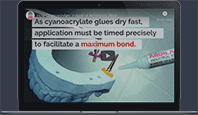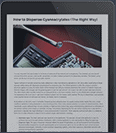Curing Speed of Cyanoacrylate
Cyanoacrylate adhesive, also called “super glue,” is a strong, fast-drying glue used in industrial, commercial, and household settings. This versatile adhesive is easy to work with, but due to its short open time and permanent adhesion, it’s important to understand how it works, its cure time, and how to prepare bonding surfaces for the best results. Read on to learn more!
What is Cyanoacrylate?
Cyanoacrylate adhesive is a liquid acryl monomer that cures or hardens in the presence of moisture. There is no mixing required, and residual moisture is usually sufficient to initiate curing, though some applications require small amounts of water or liquid activator. As it dries, polymer chains form and create a strong bond without supplemental UV radiation or heat for full curing.
There are several types of cyanoacrylate, including modified cyanoacrylates designed for less-reactive conditions, modified curing and fixture times, and longer shelf life. It is used in many household, medical, and industrial settings on materials including:
- Wood
- Metal
- Plastic
- Rubber
- Elastomers
- Paper
- Leather
- Fabric
- Ceramics
It’s important to exercise caution when applying cyanoacrylate to new materials. Some applications result in high exothermic (heat-releasing) reactions, especially when used in large amounts. For the same reason, cotton or wool gloves are not recommended when handling cyanoacrylate. Disposable nitrile gloves are best for protection against cyanoacrylates getting on worker’s hands.
Curing Speed of Cyanoacrylate
How long does cyanoacrylate take to cure? While most adhesives cure after a heating or evaporation process, cyanoacrylate fixes rapidly on contact with moisture. Even a small amount of humidity starts the curing process.
This contributes to cyanoacrylate’s incredibly short fixture time. Total cyanoacrylate cure time depends on several factors:
- Surface/material type
- The amount of moisture/humidity present
- Type of cyanoacrylate
There are even faster forms of cyanoacrylate than store-bought superglues, such as surface-insensitive varieties. Toughened types and hybrid cyanoacrylate/epoxies have slower cure times.
Fixture Time vs. Cure Time
How does cyanoacrylate cure so quickly? Technically, it is the fixture time that is very fast, often between 5 and 90 seconds. This is the amount of time until the glued assembly can be carefully handled. Full curing time, however, is when the bonding process is permanent and complete. Cyanoacrylate cure time is anywhere from 8 to 24 hours depending on the materials being bonded and the adhesive formulation used.
The Super Glue brand once demonstrated cyanoacrylate’s immense tensile strength by lifting a car shortly after application. Even more impressive, though, is the fact that this was only its fixture strength and the full cyanoacrylate cure time results in even stronger bonds.
Super glues are known for their high tensile strength, even at fixture time. Some famous examples have been illustrated in advertisements over the years, including vehicles and even people.
Preparing Surfaces for Application Cyanoacrylate Adhesives
How can bonding strength be maximized? Clean surfaces always bond best. Best practices include removing dust, oil, or grease with a detergent or cleaning solvent. Bonding primers (i.e., adhesion promoters), can also improve cyanoacrylate bonds by modifying surface energy. This promotes greater chemical reactivity between the adhesive and the surface, while also protecting the surface from contamination.
Industrial Adhesive Solutions Adapted to Your Exact Applications
At Aron Alpha, we manufacture and supply industrial cyanoacrylate adhesives, accelerators, and primers for use in many industries including:
- Automotive
- Electronics
- Industrial Assembly
- Medical
- Woodworking
- Construction
- Maintenance, Repair, and Operations (MRO)
We also offer custom formulations, lab services and testing, industrial adhesive consultation, and prototype testing.
To discuss cyanoacrylate formulations and cure time for your applications, contact us or request a quote to learn more.





